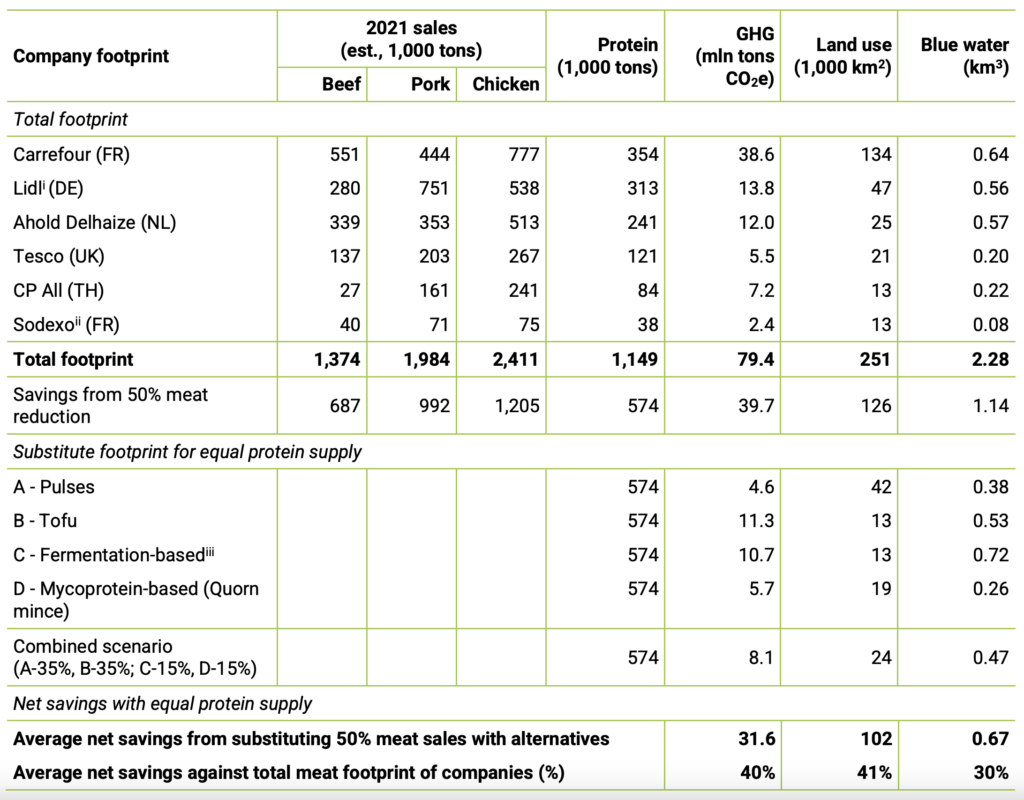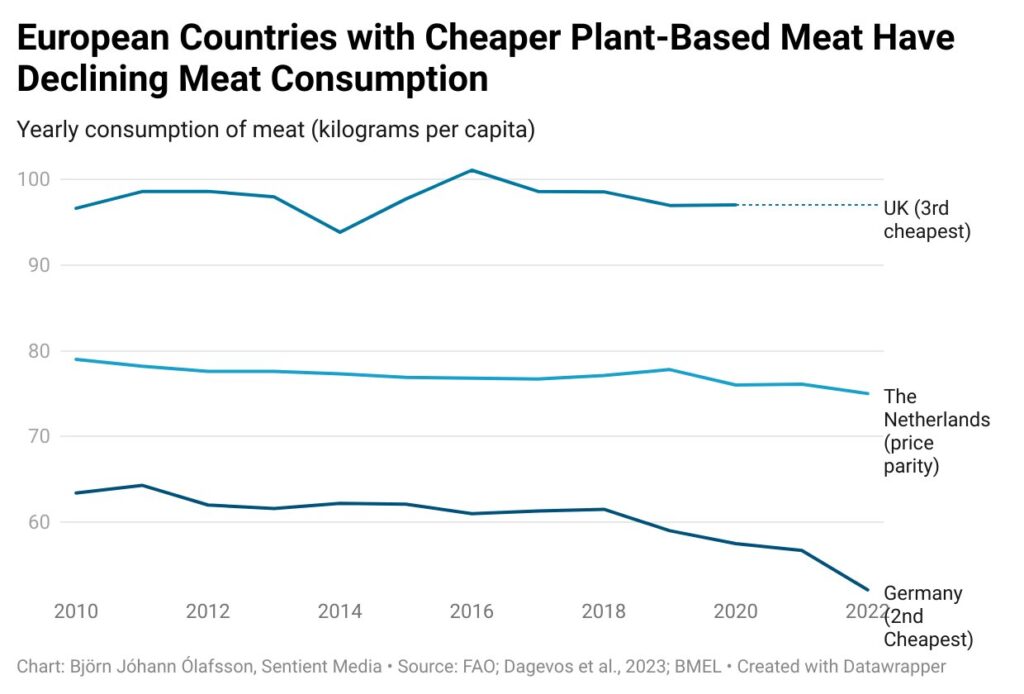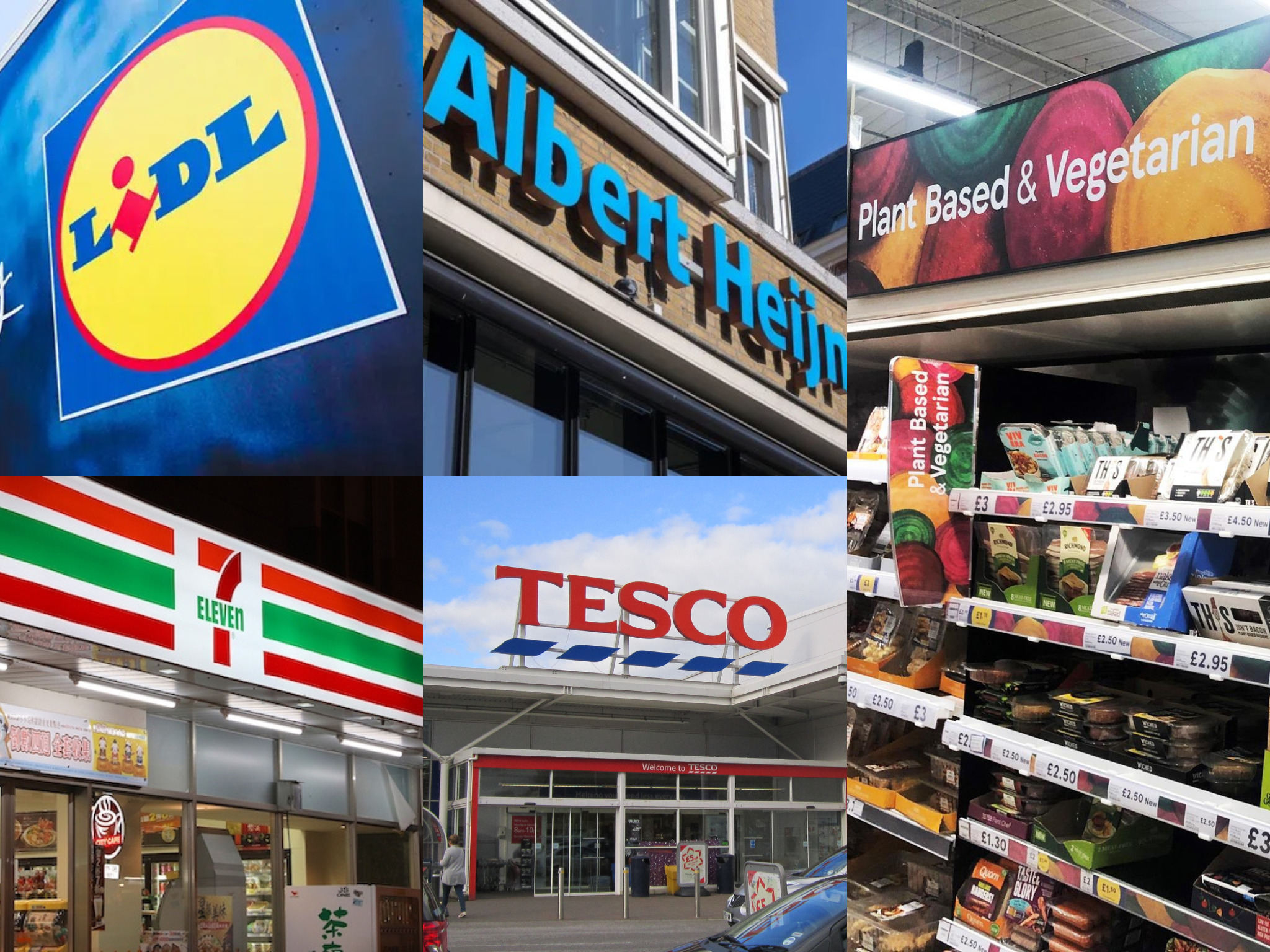If These Six EU Grocery Chains Switch to 50% Plant Proteins, They Could Offset the Emissions of 25 Million Cars
5 Mins Read
A 50% switch to plant-based proteins by six leading retailers and caterers could cut annual greenhouse gas emissions by 31.6 million tonnes, which is the equivalent of removing 25 million cars in the EU, according to a report by research consultancy Profundo.
Six leading supermarket and foodserice operators around the world could transform the food system’s emissions – which make up a third of all GHG emissions – by switching 50% of their sales from meat to vegan proteins, says a new report by Profundo, commissioned by Madre Brava.
If these companies – Ahold Delhaize (the Netherlands), Carrefour (France), CP All (operator of all 7-Eleven stores in Thailand), Lidl (Germany), Tesco (UK) and Sodexo (France) – switched to 50% plant-based proteins through a combination of whole foods (like tofu and pulses) and alt-meats (including mycoprotein and fermentation-derived proteins) by 2030, they would reduce GHG emissions by 31.6 million tonnes per year, which is equivalent to removing over 25 million cars from EU roads.
In addition, it would free up 102,000 sq km of land (about the size of Hungary) and save 670 million cubic metres of water (around 268,000 Olympic-size swimming pools) a year.
“Just six food retailers can have an outsized impact on the climate, nature, water and their own bottom line by shifting to 50% plant proteins by 2030,” said Nico Muzi, managing director of Madre Brava, who called on these companies to commit to a 50% plant protein portfolio for 2030 at COP28 (November 30 to December 12).
How supermarkets and caterers are boosting plant protein pledges

The report touched upon efforts made by many supermarkets and foodservice operators towards protein diversification, with the aim of balancing food consumption with the Eat-Lancet Commission’s planetary health diet recommendations. It suggests we should limit our annual meat intake to 15.7kg to keep in line with our climate goals, but countries like the US, Australia, Spain and Canada eat six to eight times more than this amount.
Half of Europe has been reducing its meat consumption, according to the EU’s 2023 Smart Protein report, but 7% have indicated that they have upped their intake. Retailers and foodservice companies have, however, been incentivising these consumers to cut back.
For example, Dutch supermarket Albert Heijn (owned by Ahold Delhaize) committed to achieving a 60% vegan protein share of all protein sales by 2030 in March 2022. German grocer Lidl’s Dutch branch followed suit with a 50% plant protein commitment. In fact, Lidl recently lowered the price of plant-based meat and dairy products under its own-label brand Vemondo to match the markups of their conventional counterparts in Germany, while also committing to double the share of plant protein sales in the meat, egg, dairy and fish categories to 20% by 2030.
The Compass Group, Europe’s largest foodservice contractor, pledged to replace 40% of all animal-based foods in its supply chain with alternative proteins as part of its net-zero goal. Sodexo, meanwhile, is the second-largest caterer in the continent and has pledged to increase the number of plant-based options to 33% by 2025.
What companies can do to reduce food emissions

Out of 40 of the world’s biggest supermarkets, the emissions of 93% are ‘scope 3’ – indirect emissions stemming from across their value chains, like agriculture, food processing, waste, and transport upstream – according to analysis by McKinsey. “One of the biggest challenges in decarbonising grocery is the key role dairy and meat play in the Western diet, as these products account for almost half of all product-related scope 3 emissions,” the report read.
This is why Muzi is calling for more work to be done on the part of food companies. “While some of these supermarkets have already set modest targets to increase the share of plant proteins in their overall protein sales, we need more ambition and more leaders to tackle the climate emergency,” he explained.
The 50% equation has merit. A study published in the peer-reviewed Nature Communications journal earlier this year found that replacing half of our meat and dairy consumption with plant-based analogues can bring tremendous benefits to the climate fight. Subbing beef, pork, chicken and milk with vegan counterparts would cut agricultural and land use emissions by 31%, for example, and effectively stop forest and natural land degradation. Plus, this would preserve biodiversity and conserve water.
One way for supermarket operators to effect this vegan switch is to follow Lidl’s lead with price reductions. Reporting by Sentient Media has found how countries with cheaper meat alternatives have shown a trend of decreasing meat consumption in Europe. Expanding plant offerings will help close the gap too – Germany’s Rewe Group operates two fully vegan Billa Pflanzilla stores in Austria and is now introducing dedicated plant-based aisles in 21 of its stores across the latter country. It has also dropped the cost for its own-label Vegavita range across all Billa and Billa Plus stores nationwide.
“Currently, companies and governments incentivise widespread purchasing of cheap, high-emission, unhealthy meat products through pricing, advertising, and product placement among others,” Muzi told Green Queen last month. “Instead, we can view the issue as a systemic problem in which subsidies, taxes, public procurement and corporate strategies can shift to newly incentivised plant-based and alternative proteins.”
He added: “For food security reasons, world leaders should be looking at boosting the production of protein crops and reducing the production of beef.”
And with COP28 just around the corner, there’s no better time – or place – to do so.



